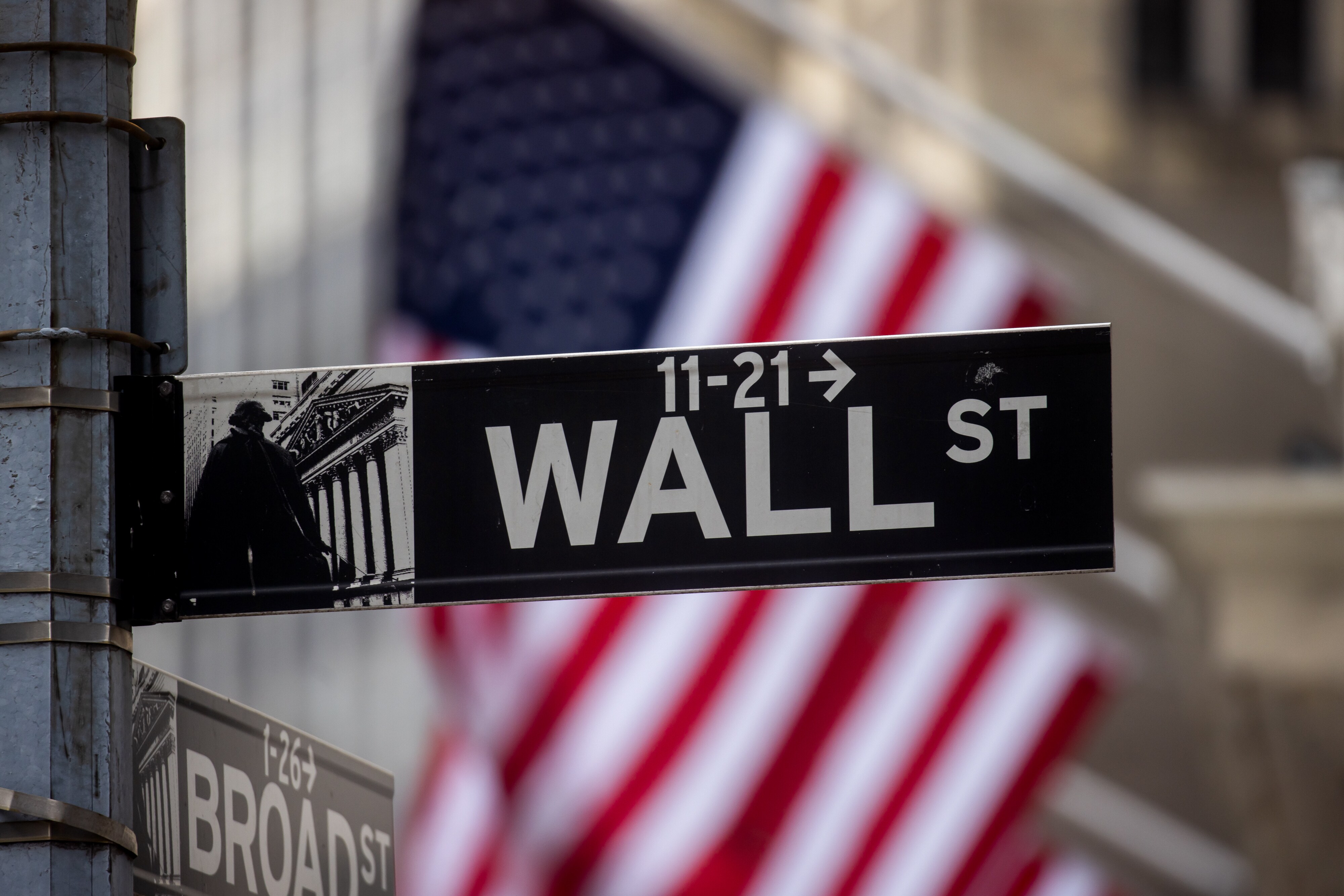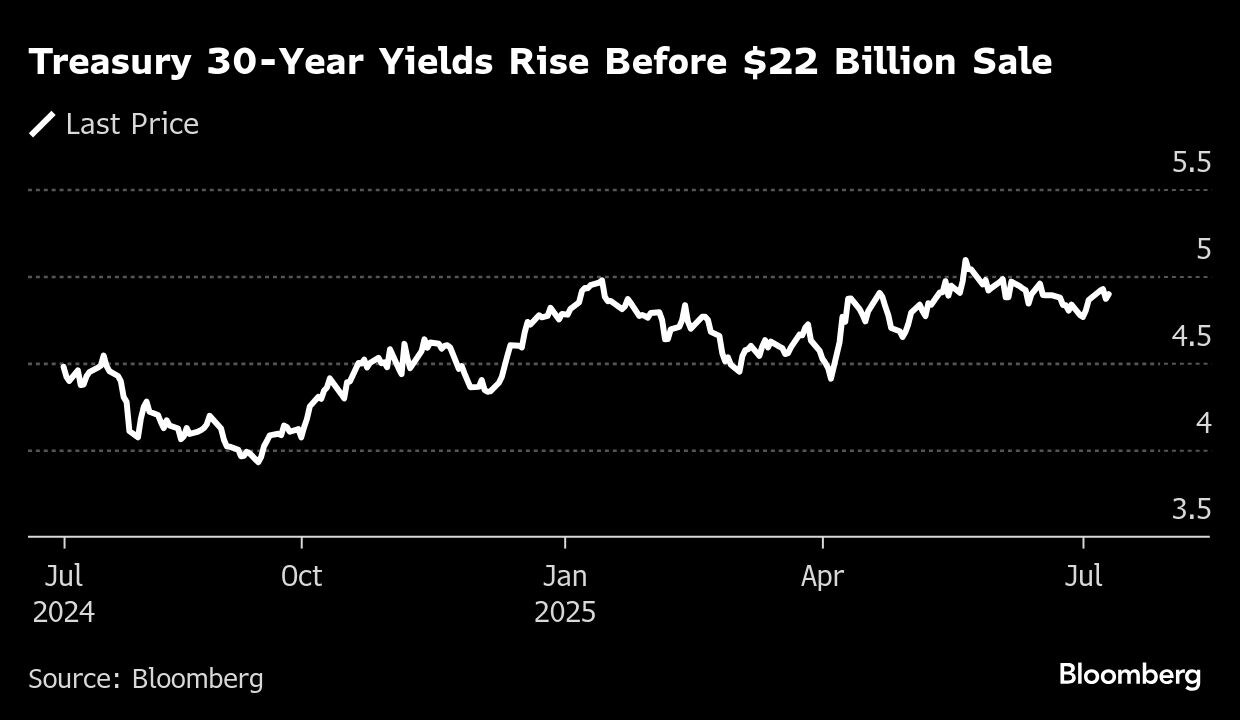
Stocks resumed their advance as traders sifted through a batch earnings reports. Treasuries fell ahead of a $22 billion sale of 30-year bonds that will test appetite for longer-term debt amid concerns about a ballooning deficit and the economic impacts of a trade war. The dollar rose.
The S&P 500 erased losses, trading just a few points away from its all-time high. An upbeat outlook from Delta Air Lines Inc. spurred an industry rally. Tesla Inc. climbed. Nvidia Corp. dropped after an advance that briefly drove its market value to $4 trillion. In a social-media post, President Donald Trump cited the surge in tech firms like the chipmaker amid his tariff policy.

Stocks resume gains.
Treasury 10-year yields climbed three basis points to 4.37%, while those on 30-year bonds rose two basis points to 4.89%. A drop in jobless claims in a period that included the Independence Day holiday was taken in stride.
Markets are caught up in a mix of sometimes contradictory risks surrounding the tariff rollout, fiscal policy and the outlook for the Federal Reserve. Yields have been rising as investors pared bets on Fed reductions. following a report last week that showed a surprisingly resilient US labor market.
Trump's flurry of new warnings have done little to rattle global markets as they did when the so-called reciprocal tariffs were announced in April, with traders focusing on the overall extension of the deadline to Aug. 1. That's effectively given trading partners an extension for talks as skepticism persists on Wall Street that he will follow through on his import taxes.
“There's zero chance we'll have tariff clarity by Aug. 1, which makes a July rate cut impossible,” said Tom Essaye of The Sevens Report. “The practical impact of this consistently delayed tariff policy is to reduce the chances of a September rate cut, which could leave rates higher for longer and increase the chances of an economic slowdown.”

Fed Bank of St. Louis President Alberto Musalem said he sees upside risks to inflation, but it's too early to know whether tariffs will have a persistent impact on prices.
Policymakers have held borrowing costs steady this year, but a divide has emerged over how many rate cuts officials expect in 2025. Fed officials will meet next July 29-30. Based on pricing in futures contracts, traders currently expect the central bank to slash rates in September.
Corporate Highlights:
Tesla Inc. will hold its annual shareholder meeting Nov. 6, the company said in a new filing with the Securities and Exchange Commission.
Tesla is aiming its driverless taxis for the San Francisco Bay area.
Elon Musk said his artificial-intelligence startup's chatbot will be coming to Tesla vehicles days after the bot posted antisemitic content on his social-media platform.
Delta Air Lines Inc. reinstated a profit outlook for the year and said travelers are coming back, prompting its stock to surge amid a fresh sense of confidence in the beaten-down US consumer.
Conagra Brands Inc. pointed to rising costs from US tariffs as the packaged food company forecast profit for this fiscal year below Wall Street's expectations.
Helen of Troy Ltd. tumbled after the consumer-products company reported net sales for the first quarter that missed the average analyst estimate, and issued a weaker-than-expected forecast for the second quarter.
Ferrero International SA agreed to acquire WK Kellogg Co. for an enterprise value of $3.1 billion, pushing the Italian family-owned candy business further into the lucrative US market.
US regulators approved Moderna Inc.'s Covid vaccine for children, but for a narrower group than before.
Autodesk Inc. is weighing an acquisition of rival engineering-software provider PTC Inc., according to people familiar with the matter.
Taiwan Semiconductor Manufacturing Co.'s revenue rose a better-than-anticipated 39% in the June quarter, buoying expectations for a sustained post-ChatGPT boom in AI spending.
Some of the main moves in markets:
Stocks
The S&P 500 rose 0.2% as of 11:19 a.m. New York time
The Nasdaq 100 fell 0.4%
The Dow Jones Industrial Average rose 0.6%
The Stoxx Europe 600 rose 0.5%
The MSCI World Index rose 0.1%
Bloomberg Magnificent 7 Total Return Index was little changed
The Russell 2000 Index rose 0.6%
Currencies
The Bloomberg Dollar Spot Index rose 0.1%
The euro fell 0.3% to $1.1685
The British pound fell 0.2% to $1.3564
The Japanese yen was little changed at 146.45 per dollar
Cryptocurrencies
Bitcoin rose 0.5% to $111,359.51
Ether rose 1.3% to $2,774.75
Bonds
The yield on 10-year Treasuries advanced three basis points to 4.37%
Germany's 10-year yield advanced three basis points to 2.70%
Britain's 10-year yield declined one basis point to 4.60%
The yield on 2-year Treasuries advanced four basis points to 3.88%
The yield on 30-year Treasuries advanced two basis points to 4.89%
Commodities
West Texas Intermediate crude fell 1.9% to $67.08 a barrel
Spot gold rose 0.2% to $3,318.96 an ounce
Essential Business Intelligence, Continuous LIVE TV, Sharp Market Insights, Practical Personal Finance Advice and Latest Stories — On NDTV Profit.























